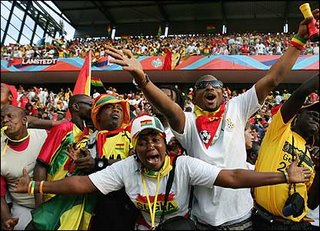As a young up-and-coming amateur germanist, I was thrilled this week to stumble upon Christian Brandstätter Verlag's publishing programme, and more specifically Wien um 1900 | Kunst und Kultur – Fokus der europäischen Moderne (October 2005) and Berlin | Die 20er Jahre (September 2006). Lavishly illustrated and featuring authoratative essays, these two books brilliantly capture the spirit of these dual golden eras that the germanophone world enjoyed before it all went tits up in 1933.
Having been simultaneously published in both German and French (Éditions Hazan), English translations are now coming out in British (Thames & Hudson) and American (Vendome Press) editions. My German skills are not where I would like them to be, so I've picked up the American edition of the Vienna book and the French edition of the Berlin book, and I am loving them. Thank goodness for Canada, where you can easily buy a French edition of a German book if no English publisher has yet got around to translating it. Wien um 1900 | Kunst und Kultur – Fokus der europäischen Moderne
Wien um 1900 | Kunst und Kultur – Fokus der europäischen Moderne
Vienne fin de siècle (FR)
Vienna 1900 and the Heroes of Modernism (UK)
Vienna 1900: Art, Life, & Culture (US)
Christian Brandstätter, General Editor
With texts by: Hans Bisanz; Marian Bisanz-Prakken; Monika Faber; Peter Gorsen; Daniela Gregori; Hanel Koeck; Richard Kurdiovsky; Rainer Metzger; and Käthe Springer.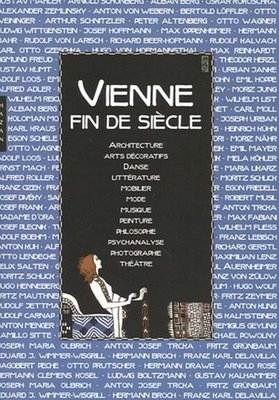 From the French publisher:
From the French publisher:Creuset de seize différentes nations réunies par l'Empire austro-hongrois finissant, Vienne «fin de siècle» a tout à la fois incarné et symbolisé le mythe et l'inextricable imbroglio de cet édifice orgueilleux sur le déclin en 1900. Le paradoxe a voulu que cette ville, synonyme d'apocalypse, à la veille d'être effacée comme capitale impériale par la Première Guerre mondiale, ait dans le vertige de sa chute su définir quelques-uns des axes de la modernité qui ont conditionné tout le XXe siècle. Tel un chant du cygne, l'extraordinaire épanouissement culturel que connaît Vienne alors concerne aussi bien les arts plastiques (avec la Sécession de Gustav Klimt, avec Egon Schiele, Oskar Kokoschka, etc.), l'architecture (avec Otto Wagner, Joseph Hoffmnn, Adolf Loos, Joseph Maria Olbrich), la musique (avec Hugo Wolf, Gustav Malder, Arnold Schönberg, Alban Berg, Anton . Webern), la littérature (avec Hugo von Hofmannsthal, Karl Kraus, Arthur Schnitzler), la naissance de la psychanalyse (avec Sigmund Freud, Viktor Adler, Wilhelm Reich) ou de nouvelles interrogations philosophiques sur le langage et les images (avec Fritz Mauthner et Ludwig , Wittgenstein). La présente encyclopédie visuelle restitue ces fortes personnalités à travers leurs ouvrages, et les archives photographiques qui ont été conservées, mais aussi les cercles, les groupes, les revues (tel Ver Sacrum), les cafés littéraires, où ce monde culturel se réunissait, le tout commenté dans le détail par les conservateurs et historiens spécialistes de chacune des disciplines.
Publication Date: October 2005
ISBN 2754100415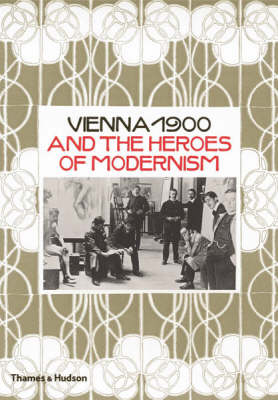 From the British publisher:
From the British publisher:Fin-de-siècle Vienna was the central gathering point of the European avant-garde and an extraordinary laboratory for new ideas and concepts.
Here is a dazzlingly illustrated (with over 700 illustrations) portrait of this astonishing cultural ferment and its most important protagonists. The contributors discuss Klimt and the artists and architects – among them Oskar Kokoschka, Egon Schiele, Josef Hoffmann and Adolf Loos – who joined him in the ‘Secession’, and reflect on the glories of the Wiener Werkstätte’s crafts, prints, graphic art and fine book production.
Themes range from the compositional logic of such musical pioneers as Hugh Wolf, Gustav Mahler, Arnold Schönberg, Alan Berg and Anton Webern to the literary and journalistic life of the Café Griensteidl, the favourite haunt of such luminaries as Hugo von Hofmannsthal, Richard Beer-Hofmann, Hermann Bahr, Peter Altenberg and Karl Kraus.
Further figures integral to the mix include Theodor Herzl, the founder of Zionism; the dramatist Arthur Schnitzler and his one-act diagnoses of the morbidly cyclical nature of washed-out emotion; Sigmund Freud, Alfred Adler and Wilhelm Reich with their masterly insights into the human psyche; and Fritz Mauthner and Ludwig Wittgenstein, pioneers in the philosophy of language.
The book includes a compact but detailed appendix that offers information on the significant figures, institutions and publications of this remarkable period.
Publication Date: August 2006
ISBN 0500513139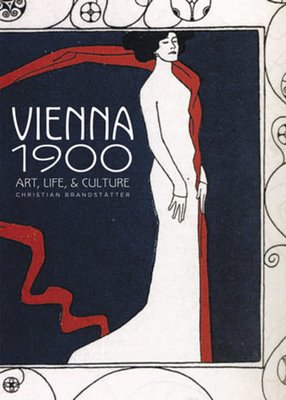 From the American Publisher:
From the American Publisher:At the turn of the 20th century, Vienna was one of the most exciting cities on earth--the central gathering spot of the European avant-garde in art, architecture, literature, music, journalism, philosophy, psychiatry, and theater. The dynamic cross-pollination among the revolutionary figures involved--Klimt, Kokoschka, the Wiener Werkstätte, Mahler, Freud, Wittgenstein, and many more--turned the Austrian capital into an extraordinary laboratory for new ideas and concepts. It is where modern was born.
With more than 500 illustrations, Vienna 1900 is a unique, concise portrait of a vibrant world and its most important protagonists.
Publication Date: October 2006
ISBN 0865651752
Sample pages: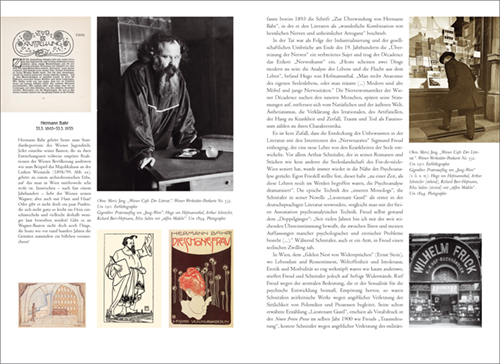
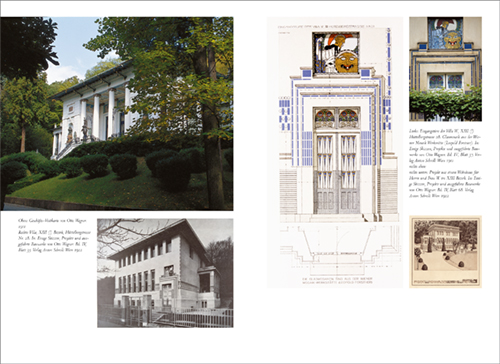
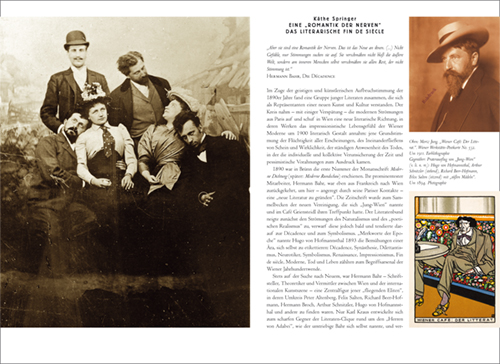
 Berlin | Die 20er Jahre
Berlin | Die 20er Jahre
Berlin : les années vingt (FR)
Berlin in the Twenties (UK)
Berlin: The Twenties (US)
Rainer Metzger, General Editor
Table of Contents (from the British edition):
1. The City as Parvenu; 2. The November Vanishing Point: Revolution and Reaction; 3. War and Peace: Expressionism and Dada; 4. The Aesthetics of Truth; 5. Unity and Purity: Utopias, Collectives, Futurism; 6. The Modern Metropolis; 7. High Culture; 8. The Truth in Flight: Berlin and the Alternative Modernity; 9. The Argument of the Masses; 10. The Third Reich or: How Was It Possible?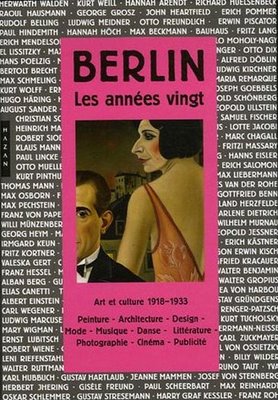 From the French publisher:
From the French publisher:C'est la République de Weimar au cours des années 1918 à 1933 qui propulsa Berlin au zénith. Ainsi, le
Berlin des années vingt a donné naissance à une culture qui a totalement vécu de la politisation. Il y germait des utopies qui, en cette époque de crise, traçaient des perspectives de progrès. La communication prenait son essor dans les sphères populaires par le biais de la photo, du cinéma, des affiches, de l'agit-prop, du cabaret et des variétés. Grâce à ces techniques, ces millions de Berlinois ne formaient plus une masse mais des citoyens : ils acquéraient à la fois un accès et une dignité à la culture. Ces évolutions venaient de la masse, mais il y avait une avant-garde pour les faire entrer dans les pratiques et les prémices des beaux-arts. Il suffit d'aligner quelques noms, George Grosz, Otto Dix, Raoul Hausmann, John Heartfield, Hannah Höch pour l'aventure Dada ; Fritz Lang, Ernst Lubitsch pour le cinéma et la photographie ; Mies van der Rohe, Moholy-Nagy, Lissitzky pour les grandes conquêtes utopistes ou fonctionnelles de l'architecture, du design et de l'œuvre d'art totale, pour prendre la mesure de ces années de révolutions et de créations tous azimuts.
Publication Date: October 2006
ISBN 2754101128 From the American Publisher:
From the American Publisher:Berlin, a haunting vision of the twentieth century’s first modern city, is a cultural history filled with 400 shockingly fresh and romantic photographs, paintings, and other images.
In the brief years between the twentieth century’s two cataclysmic world wars, the modern metropolis was invented in Berlin. Life in Berlin was a cabaret, and Marlene Dietrich, Thomas Mann, Alfred Einstein, or Joseph Goebbels might be seated at the next table. The avant-garde thrived there. The mass media magnified the impact of everything from fads to political ideas. Subcultures and club cultures nurtured gender-bending fashions and lifestyles. Architects and designers struggled to free themselves from the past. In the background beat the new rhythms of urban experience: the coming and going of the latest planes and trains and automobiles, the clacking of typewriters in vast offices, the jazz band that never sleeps. Berlin: The Twenties is a book for history buffs, travelers, and lovers of modern art and design.
Publication Date: May 2007
ISBN 0810993295 From the British publisher:
From the British publisher:Berlin in the 1920s was home to some of the most extraordinary minds of modern times, and was a vigorous melting pot of radical new ideas and concepts in every field. There was a massive boom in popular artforms, including photography and cinema, graphic design and poster art, agitprop and cabaret, which gave all the people of the city a chance to enter the cultural arena. Comprising essays on the key movements and figures of the era, this profusely illustrated book is a highly readable portrait of this astonishing cultural ferment and its most important protagonists.
Publication Date: April 2007
ISBN 0500513546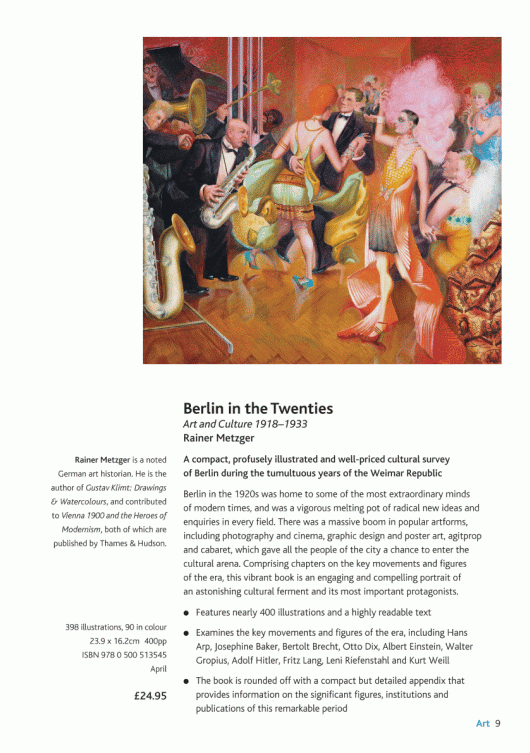
Sample pages: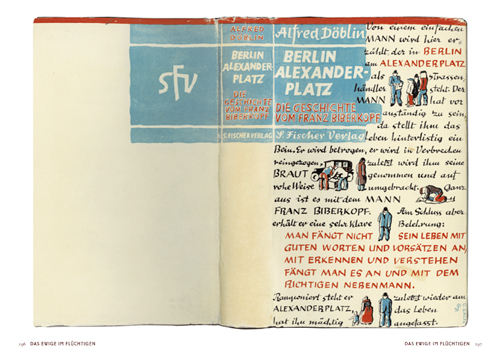
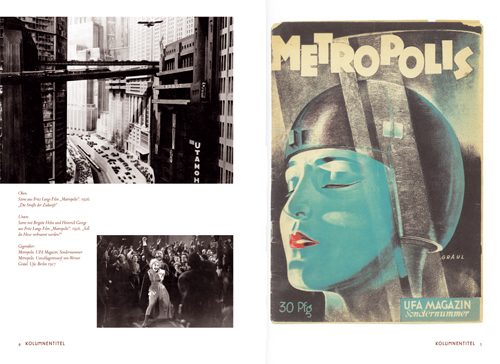


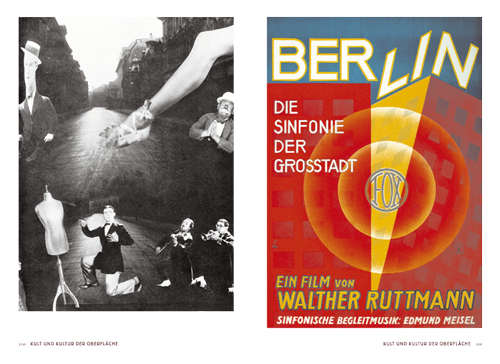
15 December 2006
Early Twentieth Century German Culture
30 November 2006
Things They Don't Got Here
Over the past few years, as I've extolled the virtues of Montreal while languishing in Winnipeg, exasperated interlocutors have often exlaimed 'what don't they have in Montreal?!'. Now that I've been here for a few months, I can start to answer that question. Rapid transit, film festivals, bike lanes and a general European feel are all well and good, but there are a few things missing:
Notwithstanding, I am still thrilled to be here; all of the postive aspects of life here more than counterbalance the few lacunes outlined above.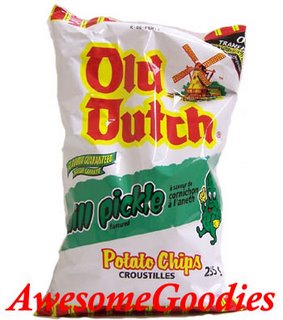 Old Dutch Potato Chips. This is the obvious one. It's fairly well-known on the Prairies that when you move out East, you sacrifice easy access to perhaps the world's best crisps, made with loving care in Winnipeg and Calgary. When I was a lad my cousin moved to Ottawa and would always stock up on Old Dutch whenever she was back in Winnipeg, and I suspect I'll be no different. In all Canadian cities, especially in the big ones like Montreal, there are specialty food shops catering to ethnic groups from almost every country in the world, but nothing for us folks from the West. I can easily find obscure brands of Caribbean hot sauce, but no potato chips made two provinces over. Just another Canadian paradox.
Old Dutch Potato Chips. This is the obvious one. It's fairly well-known on the Prairies that when you move out East, you sacrifice easy access to perhaps the world's best crisps, made with loving care in Winnipeg and Calgary. When I was a lad my cousin moved to Ottawa and would always stock up on Old Dutch whenever she was back in Winnipeg, and I suspect I'll be no different. In all Canadian cities, especially in the big ones like Montreal, there are specialty food shops catering to ethnic groups from almost every country in the world, but nothing for us folks from the West. I can easily find obscure brands of Caribbean hot sauce, but no potato chips made two provinces over. Just another Canadian paradox.
28 November 2006
From Winnipeg to Montreal in Three Months Flat
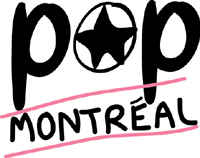 Well, here we are once again. After an absence of almost four months, I've decided to come back and do some blogging again. While I wasn't blogging I was moving my life 2000km east, and am now comfortably installed in Montreal, the land of film festivals, bike lanes, bookshops and rapid transit. Having been born and raised in Winnipeg, it was not an easy decision to leave, but after nearly 25 years I was ready to try something new. Since my first visit in 1999, I always thought in the back of my mind that I might want to try and make a go of it out here, and now seemed as good a time as any. Better to have a go now while I'm still young. If I don't like it after five years, I can always go back (or move on), and I still won't even be 30 years old.
Well, here we are once again. After an absence of almost four months, I've decided to come back and do some blogging again. While I wasn't blogging I was moving my life 2000km east, and am now comfortably installed in Montreal, the land of film festivals, bike lanes, bookshops and rapid transit. Having been born and raised in Winnipeg, it was not an easy decision to leave, but after nearly 25 years I was ready to try something new. Since my first visit in 1999, I always thought in the back of my mind that I might want to try and make a go of it out here, and now seemed as good a time as any. Better to have a go now while I'm still young. If I don't like it after five years, I can always go back (or move on), and I still won't even be 30 years old.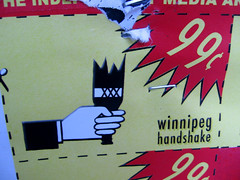 In the coming days, weeks and months I'll be writing quite a bit about what it's like living here, especially about how it differs from life back home (as I still refer to it... for now). At this point, it's officially the longest time in my life that I have ever spent away from Winnipeg. In 2001 I did a 13-week internship with the Government of Quebec in Quebec City, but it's now over 14 weeks since I moved here.
In the coming days, weeks and months I'll be writing quite a bit about what it's like living here, especially about how it differs from life back home (as I still refer to it... for now). At this point, it's officially the longest time in my life that I have ever spent away from Winnipeg. In 2001 I did a 13-week internship with the Government of Quebec in Quebec City, but it's now over 14 weeks since I moved here.
Another young Winnipegger flees the city of his birth. It's that same, depressing, oft-repeated scenario, but at least I didn't move to Calgary or Toronto...
05 August 2006
Les citations du jour 2006-08-05
Parmi les commentaires suscités par ce billet de blog au sujet de la qualité du français au Québec, retenons les phrases suivantes :Au Québec, parler un français hexagonal, digne d'une page éditoriale du Monde Diplomatique, c'est s'exposer dangereusement à de lourdes représailles qui peuvent aller jusqu'aux coups.[Permalien]
Je me demande bien sur quoi, nous les québécois francophones, appuyons notre fierté nationaliste alors que nos universitaires peinent souvent à former des phrases cohérentes et alors que des soubrettes françaises expriment distinctement leurs idées avec des phrases dignes d'une langue littéraire....[Permalien]
Regardez et écoutez nos bons artistes canadiens français québécois qui sont supposés être les haut-parleurs de notre langue:
Star academie, Excès de stars, Elvis story, Les Boys, Showtime, et maintenant Bon Cop Bad Cop. Etc. Etc...
Ils ont des leçons à nous donner? C'est vrai, c'est de la faute du fédéral et du Canada anglais...[Permalien]Les universités ont failli aussi dans cette tâche en baissant les bras...Quand l'Université Laval s'adresse à mes jeunes "Chers gradués" et"débutez le questionnaire..."et quand à la maïtrise l'élève demande au prof:"on les apprend-tu toutes les poèmes?" sans que le professeur ne bronche,aussi bien dire que le ver est dans le fruit...et là,je ne vous fais pas rapport de ce que j'entends dans le chantier de construction à deux rues d'ici..Pour moi,cette partie est perdue,mais entre-temps,ça peut amuser réviseurs linguistiques,traducteurs et tutti quanti...[Permalien]
Je vous recommande fortement la lecture du billet d'origine et de sa suite, ainsi que les autres commentaires qui s'y trouvent, pour retrouver l'intégralité contextuelle des propos cités ci-haut.
Après les acquis de la révolution tranquille, il me semble que c'est maintenant la qualité du français qui doit être le grand enjeu linguistique au Québec. Récemment, j'ai fait remarquer l'incongruité de la phrase suivante : SÉPARONS NOUS DES TETE CARRER ET DES LIBERAL ET VIVE LE BLOC QUÉBECOIS (sic). C'était plus facile de m'insulter que de reconnaître que ce jeune revendiquait un état francophone souverain dans un français pourri, et qu'il existe un vrai problème au Québec. Le combat pour un français de qualité est loin d'être gagné.
18 July 2006
Aidez l'Espagne
 This morning I was greeted with the following bit of wonderful news in the Nouvel observateur:
This morning I was greeted with the following bit of wonderful news in the Nouvel observateur:29,8% des Espagnols juge que le soulèvement militaire du général Franco, point de départ de la guerre civile espagnole, était 'justifié'
Yes indeed. Nearly a third of Spaniards still believe that Franco's uprising was justified. Good on them. When I wrote earlier this month that I thought that there seemed to be something of a chevauchement between Spanish support at the World Cup and Franco's Fan Club, I had no idea that the attitude of these fans of Franco (and possibly of football) had pervaded Spanish society as a whole. Golly! You can implore Aidez l'Espagne all you want, but if after all these decades we're still here, there doesn't seem much we can do. At the end of the day, nul n'est servi mieux que par soi-même. Before we can do anything for them they're going to have to help themselves a little bit.
16 July 2006
Le ciel d'été remplit nos coeurs de sa lucidité
 With temperatures surpassing 35°C this week, it is safe to say that summer has definitely arrived on plains of central Canada. From -35°C in the winter to 35°C in the summer, the continental climate continues to do its thing.
With temperatures surpassing 35°C this week, it is safe to say that summer has definitely arrived on plains of central Canada. From -35°C in the winter to 35°C in the summer, the continental climate continues to do its thing.
It's times like this that you wish Canada were just a bit smaller, to facilitate travel, and that it had a Côte d'Azur, so you would have somewhere to go. I suppose I've always implicitly had this feeling, somewhere in the back of my mind, but when L'Express publishes a feature on the Riviera, including its top 10 beaches, effectively rubbing it in your face, there's really no escaping it, is there? You just want to hop into your car and zip down to Juan-les-Pins on the Nationale 7, that mythical link between the capital and the sea & sun that Charles Trenet celebrated in song back in 1955. Have a listen to Stereo Total's 2001 cover version of his Route Nationale 7 by clicking here (the location of this mp3 sample is dynamic, so I couldn't embed it in the page, but this m3u file that points to it appears to be static; the link will launch your computer's default application for m3u files). Despite the advent of motorways and TGVs, the queen of the routes nationales is still the way to travel.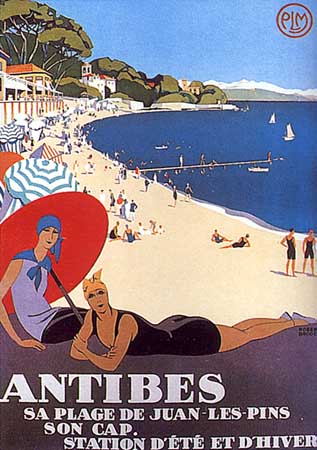
Unfortunately for me, an excursion to the Riviera is just out of my reach, so I'll have to settle for Jim Ring's new(ish) book Riviera: The Rise and Rise of the Côte d'Azur, and my old 1:100000 scale Michelin map of the Côte d'Azur from 1989. Also, in keeping with the theme, I highly recommend J.G. Ballard's 2000 literary techno-thriller Super-Cannes, as well as his review in The Guardian of the aforementioned book by Jim Ring. Finally, if you like these two vintage posters, you'll want to know that both were designed circa 1930 by a certain Roger Broders, the most accomplished affichiste of the golden era of French travel posters. He seemed to mainly do work for locations on the French Riviera and in the French Alps (including this alpine masterpiece from 1927 that I have hanging up on my wall), but he also realised posters for locations around the world. If you're as hardcore as me, you'll also want to pick up the recueil of his travel posters recently published by Queen Art.
Purchase the items mentioned in this post
Musique automatique by Stereo Total: [Canada] [France] [Deutschland] [UK] [USA]
Riviera by Jim Ring: [Canada] [France] [Deutschland] [UK]
Super-Cannes by J.G. Ballard: [Canada] [France] [Deutschland] [UK] [USA]
Roger Broders, Travel Posters: [Canada] [France] [USA]
Site News 2006-07-16
It's been a full week since the end of the Fußball-WM, so I've purged all of the frivilous sporting content from the right-hand sidebar. In its place, I've added a new feature that I'm calling The Literary Supplement. It will always have links to the ten most recent (the rest can be found here) literature-related bits of content published by the sources I most regularly consult. This is also available as an Atom feed. While we're on the topic, I'll do a quick run-down of what else is currently populating the sidebar on the right-hand side of the main page.
Unfortunately Podnova is currently down, but when it goes back online I'll put back the integrated flash-based rss mp3 player that allows anyone to listen to my podcast queue right from the sidebar. The whole affair, including the corresponding RSS feed, is powered by Podnova and consequently doesn't work right now.
Another feature in the right-hand sidebar is the long-running Read What I'm Reading module. It always has links to the ten most recent (the rest can be found here) bits of syndicated web content that I've read and found interesting. This is also available as an Atom feed.
The busiest bit of sidebar action is the permanently-shuffling rectangle featuring my meagre (but growing) oeuvre of amateur photography. This too is available as an RSS feed.
The rest of the sidebar content is self-explanatory. You've got the standard links, previous posts and archives sections, as well as my e-mail address and RSS & Atom syndication options for the blog.
La citation du jour 2006-07-16
Le grand public pense que les livres, comme les oeufs, gagnent à être consommés frais. C'est pour cette raison qu'il choisit toujours la nouveauté. -Goethe (via Heileen)
Goethe is saying that the general public thinks that books, like eggs, should be consumed fresh. For this reason, the average punter tends to choose new releases. Of course the average punter these days isn't likely to choose a book at all, but this idea can be applied to the consumption of culture in general (television, cinema, etc.).
This is as true today as it was in the time of Goethe, particularly in the Anglo-saxon publishing world, where new releases in hardback can be found piled high in supermarket bargain bins just months after publication, thereby making room in the 'proper' bookshops for the next slate of throwaway bestsellers.
In the world of French publishing, hardbacks barely even exist anymore. Most new releases are done in a high-quality trade paperback format, and very often they remain in print for decades after their initial publication. After a year or so many books will also be available in the poche format, which is of a slighly better quality than the Anglo-saxon mass market paperback format. I wouldn't be surprised if the hardback format remains in use in the Anglo-saxon publishing world specifically because it stands up better to the demands of the supermarket bargain bin environment, i.e. an environment where books are chucked about by philistines like so many pieces of worthless tat.
What can you say? You just get the feeling that the written word is treated with more reverence in certain cultures than in others. Different strokes for different folks...
14 July 2006
La citation du jour 2006-07-14
Interroggée sur l'antenne de France 2 dans le cadre du 14 juillet, Michèle Alliot-Marie, la ministre française de la défense, a dit:L'armée a réagi avec beaucoup de réactivité
Can you say langue de bois?
13 July 2006
La citation du jour 2006-07-13
The newest feature of this blog is the tried and tested Quote of the Day. This, the inaugural entry, comes courtesy of Lucas Armati writing in Télérama's Blog Télévision:Marre de ces [....] documentaires dont le seul suspense consiste à savoir s'il s'agit d'une coproduction franco-allemande ou germano-française ?
Lamenting the state of summertime telly in France, he asks: 'Aren't you sick of these documentaries whose only suspense consists of finding out if it's a Franco-German or Germano-French co-production?'
Outstanding!
Les ponts de Paris
There's a wonderful article by John Lichfield in today's Independent about the new Passerelle Simone de Beauvoir, and more generally about the history of bridges in Paris.
Choice extracts:The bridge is both chaotically modern, and graceful, preserving a long tradition of epoch-defining but beautiful Parisian bridges going back for 400 years.
[....]
Paris has more river bridges than any other city.Other river-bisected cities, such as London, Rome and Budapest, have a dominant bank. The Right Bank and Left Bank of Paris, although different in character and preoccupations, are equal partners.
The President lives on the Right Bank; the Prime Minister's official residence is on the Left Bank. The principal business quarter is on the right, but the parliament and most academic institutions are on the left. Ministries and museums are scattered on both sides. Some urban historians say that the proliferation of bridges explains why Paris has developed so evenly on both sides of the river. Others suggest that the fact that both Rive Gauche and Rive Droite were equally important forced the Parisians to build a lot of bridges.
[....]
The oldest surviving Paris bridge is, theoretically, Le Pont Neuf (the new bridge), completed in 1607. Its 12 low, sweeping arches and its breadth made it one of the wonders of Europe in the 17th century.
[....]
The Simone Beauvoir bridge continues this all-purpose tradition. If you walk along the oak planks all the way from the high sides of the Parc de Bercy to the top of the steep steps in front of the library, you cover 300 metres. You can, however, divert on to the lower deck or arrive or leave by the slopes, stairs and lifts to the lower Seine quays.
The high deck gives you a splendid view of eastern Paris, with the double-deck Bercy bridge carrying both Metro trains and cars in the foreground. There are glimpses from the northern end of the Eiffel Tower and Notre Dame. The lower deck takes you close to the water, just above the tourist launches and the barges full of coal or gravel.
Fascinating stuff...
12 July 2006
L'été à Lutèce
 It could be my small-town naïveté, but I have never heard of anything like this. Paris has just inaugurated (slideshow) its 35th municipal public baths. Nothing too extraordinary in that, except that this swimming pool floats on the Seine. It's called the Piscine Joséphine Baker and is moored on the Left Bank, just opposite the Bibliothèque Françcois-Mitterrand. On board this floating marvel, in addition to a 10x25 metre swimming pool, one can also enjoy a pataugeoire, saunas, a jacuzzi, Turkish baths, a restaurant and snack bar and a fitness centre including weight room. There are also two solariums, one on board and one on the adjacent land, where people can relax and get a natural tan. If that weren't enough, it also has an eco-friendly ozone water treatment system that purifies the water from the Seine as it is pumped into and out of the pool. The facility will be operate daily, year round (the roof can be opened or closed in a matter of minutes), and will be open as late as midnight on certain days.
It could be my small-town naïveté, but I have never heard of anything like this. Paris has just inaugurated (slideshow) its 35th municipal public baths. Nothing too extraordinary in that, except that this swimming pool floats on the Seine. It's called the Piscine Joséphine Baker and is moored on the Left Bank, just opposite the Bibliothèque Françcois-Mitterrand. On board this floating marvel, in addition to a 10x25 metre swimming pool, one can also enjoy a pataugeoire, saunas, a jacuzzi, Turkish baths, a restaurant and snack bar and a fitness centre including weight room. There are also two solariums, one on board and one on the adjacent land, where people can relax and get a natural tan. If that weren't enough, it also has an eco-friendly ozone water treatment system that purifies the water from the Seine as it is pumped into and out of the pool. The facility will be operate daily, year round (the roof can be opened or closed in a matter of minutes), and will be open as late as midnight on certain days.
The construction took 18 months and cost 17 million euros. Bertrand Delanoë, the Socialist mayor of Paris, says that the most important thing about this realisation is that it enables all citizens to have access to what is beau and joli. I cannot imagine a publicly-funded project in this part of the world going ahead on that basis. The concept that beauty could somehow improve or enhance our lives and therefore be considered to be a legitimate aim of the state (i.e. if you're already going to build a swimming pool, you might as well put in a bit of effort and make it interesting and not ugly) is completely and utterly foreign in these parts. The Piscine Joséphine Baker is right next to the brand new Passerelle Simone de Beauvoir, an ultra-modern footbridge over the Seine that's due to open tomorrow. It's the 37th parisian bridge currently spanning the Seine and, according to The Independent, Paris continues to boast more river bridges than any other city in the world. Together, the floating pool and footbridge will form the centrepiece of this year's Paris Plages, which since 2002, through the reduction of traffic, the importation of huge quantities of sand and the organisation of numerous activites, has transformed the Right Bank
The Piscine Joséphine Baker is right next to the brand new Passerelle Simone de Beauvoir, an ultra-modern footbridge over the Seine that's due to open tomorrow. It's the 37th parisian bridge currently spanning the Seine and, according to The Independent, Paris continues to boast more river bridges than any other city in the world. Together, the floating pool and footbridge will form the centrepiece of this year's Paris Plages, which since 2002, through the reduction of traffic, the importation of huge quantities of sand and the organisation of numerous activites, has transformed the Right Bank 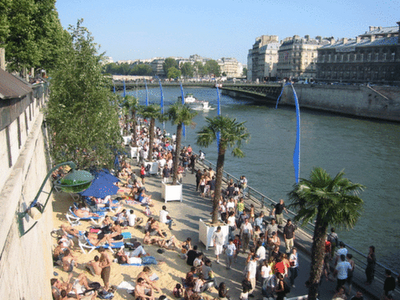 (and as of this year also the Left Bank) of the Seine into a beach-front holiday resort for those not fortunate enough to escape the capital during the summer holiday season. Of course one can access Paris Plages by métro, bus or boat, and there's even a boat service linking the different sites. It all sounds like too much fun. As the self-proclaimed River City of Canada, we should try something similar over here. It will never happen though. The mayor's too busy covering our urban parkland with condos.
(and as of this year also the Left Bank) of the Seine into a beach-front holiday resort for those not fortunate enough to escape the capital during the summer holiday season. Of course one can access Paris Plages by métro, bus or boat, and there's even a boat service linking the different sites. It all sounds like too much fun. As the self-proclaimed River City of Canada, we should try something similar over here. It will never happen though. The mayor's too busy covering our urban parkland with condos.
As an aside, both Le Montieur and French Duck report that there used to be another floating swimming pool on the Seine called the Piscine Deligny. The details are a bit sketchy, but it was apparently run as private enterprise and was bulit back in 1805. Depending upon who you believe, it sunk either on 8 July 1993, or sometime in 1995. Meanwhile, Delanoë has promised a second floating municipal pool, to be moored in the 15th arrondissement, just opposite André Citroën Park. It should be ready by 2010 at the latest.
I tell ya, it's a heck of a town. Can you imagine what sort of things they would be coming up with if they had actually been awarded the 2012 Olympics? The mind boggles...
09 July 2006
Oh là là là là !
 Amy Lawrence had it spot on exactly one week ago today: Genius always comes with a dark side. Neverterless, Zidane remains the greatest footballer that I will have seen in my lifetime. Merci Zizou!
Amy Lawrence had it spot on exactly one week ago today: Genius always comes with a dark side. Neverterless, Zidane remains the greatest footballer that I will have seen in my lifetime. Merci Zizou!
In the end, it came down to a single, narrowly missed penalty by Trezeguet. He'd hardly been given a kick at the ball the whole tournament, and to go from virtual inactivity to then be thown into perhaps the most stressful situation of his entire career could not have been easy. I don't blame him at all.
I'd kept quiet once we started to win, but I don't know how Domenech was not able to find a way to play Henry and Trezeguet together. As two of the highest scoring players this season in England and Italy respectively, they surely would have formed a formidable attacking partnership. Bit of a waste that. In any case, we dominated from half-time onwards, but simply could not find a winning goal.
Féliciations à l'Italie, et merci à l'Équipe de France pour nous avoir fait vivre cette belle aventure.
06 July 2006
On est en finale, on est en finale, on est, on est, on est en finale

Well, here we are. At the beginning of this whole affair, nobody thought France would be anywhere near the final. The 2004-2005 qualifying campaign was turning into a nightmare; although they hadn't lost a single match, France drew with Israel and Switzerland twice, and Ireland once, and were in danger of not qualifying. In the end the old guard came back and France ended up winning the group, but could just as easily been eliminated had they not won their final match. Then there were the three unimpressive friendlies in the run up to the finals against Mexico, Denmark and China, culminating in the injury that put Djibril Cissé out of the World Cup (injured Cissé is now available as an action figure; yikes!).
The World Cup itself started off badly. After the effect he had as a super-sub, or joker as they say in French, the press were demanding that Franck Ribéry be part of the starting line up. Raymond Domenech then started him in the first match against Switzerland and they didn't win. Ribéry didn't look as effective as he had done as a subsitute and even less so as the match wore on, so of course everyone said that he should only have come on as a substitute and that the manager didn't know what he was doing.
After opening with draws against Switzerland ans South Korea (although they should have beat the latter after having had a goal disallowed even though the ball clearly crossed the line), France needed to beat Togo by two goals in their final group match to be guaranteed passage into the knockout stage,and Zidane would not be able to play because of a one match suspension. Around the world, among both the press and the general public, the consensus was that the team was too old. Domenech didn't have a clue and Zidane et Cie were simply washed up. All the while, Domench answered his critics by saying he would see them on 9 July. Nobody believed him for a second. Many thought that it was a good thing that Zidane was suspended as it saved Domench from having to drop him, especially as he will retire at the end of the World Cup and they could have been eliminated after that match.
It was at this point that I realised that I was no longer a neutral watching this competition. As a Canadian, my team hasn't been in the World Cup since 1986, when I was but a lad of four, so I generally just enjoy the footie, hoping for England (English is my mother tongue and I've always been a bit of an anglophile) or France (I was educated in French, Canada's other national culture) to do something good. In this World Cup the country of my father's birth and the country of my maternal grandfather's family were also both qualified, but I don't feel the same attachment to either team. As I slipped away from work to watch the second half of France-Togo on the big screen down the street, I came to the realisation that I really wanted them to win. A couple of weeks ago on the French radio programme On va s'gêner (rss podcast), Belgian panelist Maureen Dor said that she had been back in Belgium during the France-Spain match and, despite the taunts of her incredulous compatriots, she really wanted France to win. She's been living in France for a few years now, and she suddenly had the epiphany on that matchday that she finally feels French now that she wants France to win at football. She went on to add that amidst all of the talk from hard-line French interior minister Nicolas Sarkozy about citizenship tests for immigrants, all they really have to do is sit potential candidates for citizenship down in front of a football match featuring France and whatever country they've come from, and if they cheer for France they can stay. What's that you say? That's ridiculously simplistic and not particularly funny? Well, it made me laugh at the time...
In Canada, this supposedly Commonwealth country that's really nothing more than a province of Hollywood in the parts that speak English, we have easier access to French television (and arguably French books ) than we do to books and television from Britain, and thanks to region-free DVD players, podcasting and the Internet in general, I find myself becoming more and more culturally French. This was becoming evident in my increasing cultural isolation from my generation, mainly because I haven't seen any of the Hollywood rubbish that they have, nor have I heard the latest top-40 'music' that will be the soundtrack to their summer. For all the talk of the americanisation of France, they're still holding out better than the British. Also, like a French person, from time to time I actually read books. Not Da Vinci Code because the movie was 'AWESOME!'. No, I read actual (not just French) books. Honest to God... And now to top it all off I want France to win at Football.
In the following match against Spain, even if the Spanish coach and fans hadn't been such racists, I would have still desperately wanted France to win. Even if the Spanish fans hadn't booed and whistled during La Marseillaise (also the anthem of the republicans during the Spanish Civil War) and even if the Spanish press hadn't declared they were going to send Zidane, who plays his club football in Madrid, into retirement, I would still have been four-square behind the l'escouade française. At the same time, it made it all the more enjoyable to silence Franco's fan club, these representatives of a supposedly modern country that still harbours such strong racist and anti-republican tendancies and displays them openly in the context of an international manifestation of sport and friendship. The contrast between the French and Spanish nations really was quite striking. In response to Miró's call of Aidez l'Espagne, I would say that it needs all the help it can get. Conversely, when England went out to Portugal, it didn't affect me in any significant way. I still feel a great attachment to Britain, but not, I fear, to the same extent that I now do to France. Now we're (yes, the first-person plural is wholly appropriate) in the final, and you just get the feeling we're going to go all the way. With a repeat of the Euro 2000 final in Rotterdam in prospect, we've got a player who scored 29 goals in Italian football this season on the bench. David Trezeguet did it against Italy six years ago in Rotterdam, and could easily do it again...
There have been celebrations in Paris after each of the victories against Spain, Brazil and Portugal to rival the one held after they won the final back in 1998, and the whole country has been swept up in the spirit of optimism. After the rioting in the suburbs, the protests against the CPE and the Clearstream Affair (about which, as predicted, we have heard nothing since the beginning of the World Cup), it's a nice change of pace. It's a bit cliché to associate the state of a nation with the state of its football team, and the black-blanc-beur euphoria following the 1998 World Cup was certainly démentie by the 2002 French presidential election where nearly 20% of voters backed the far-right, and by the aforementioned riots. Nevertheless, you've got to hope that some of this rubs off on the nation as a whole. I've read La maladie allemande (The German Malady; see below) and The French Malady. With some luck the unexpected performances of both nations' football teams will contribute to higher spirits in both France and Germany, and ultimately to a relance of the European project, whose very existence depends upon the dual impulsion of both countries.
From the ironic chants of Allez les vieux of a few weeks ago, the fickle French are once again behind their sélection nationale, an entire nation in full voice.
Allez les Bleus !
Purchase La maladie allemande: [Canada] [France] [Deutschland]
04 July 2006
Dodgy Balls
If you were to read the following, would you think that terrorism had struck again?The police are still not certain if all the balls are out of circulation, and have asked Berliners to report any suspicious looking footballs immediately.
Rest assured, it hasn't. I couldn't help finding this somewhat amusing, malgré moi.
*Update: It turns out that 'twas but a harmless Austrian art project.
The challenge 'Can You Kick It?' had several possible interpretations, the group argued. "The sentence can also mean: football affects us all or football is everywhere," said the group.Well, I'm satisfied.
27 June 2006
Fußball Weltmeisterschaft Sidebar Content
I should have set this up earlier, but have been too lazy and/or busy to do so. In any case, for the rest of the World Cup, you'll find all the latest from Germany in the sidebar via my hand-crafted World Cup podcast channel and reading list. You too can drown in the sea of content that has already swallowed me whole...
Subscription options:
20 June 2006
L'affiche publicitaire française (1)
 Hooray! I've finally found someone in Winnipeg that sells Orangina in a nice, big 1750mL bottle. Much better than paying $2 for a tiny little bottle on Osborne, Corydon or Provencher. You know Orangina, right? That wonderful little French drink that's not much more than carbonated water and orange juice, the Orangensaft mit Sodawasser that I so enjoyed during my boyhood trip to Europe. But it's not just that it tastes better and is more refreshing than any soft drink you've ever had. There's also the legendary iconography created by Bernard Villemot, of which the poster featured here is the best known example. I must confess that the whole Orangina experience somehow transports me to the Côte d'Azur, perhaps during the earlier part of the twentieth century, and I can just imagine myself relaxing at Antibes or Juan-les-Pins, enjoying the sun and sipping a surprisingly refreshing citrus-based carbonated beverage. Ridiculous, certes, but much more enjoyable than living in the real world. If any of this resonates with you, then you will certainly want to visit the Virtual Orangina Museum, and to see more of the work of Bernard Villemot. If you're really hardcore like me, then you will also want to pick up the beautiful book (see below for purchasing information) that came out last year featuring Villemot's best posters (Hoëbeke, 2005).
Hooray! I've finally found someone in Winnipeg that sells Orangina in a nice, big 1750mL bottle. Much better than paying $2 for a tiny little bottle on Osborne, Corydon or Provencher. You know Orangina, right? That wonderful little French drink that's not much more than carbonated water and orange juice, the Orangensaft mit Sodawasser that I so enjoyed during my boyhood trip to Europe. But it's not just that it tastes better and is more refreshing than any soft drink you've ever had. There's also the legendary iconography created by Bernard Villemot, of which the poster featured here is the best known example. I must confess that the whole Orangina experience somehow transports me to the Côte d'Azur, perhaps during the earlier part of the twentieth century, and I can just imagine myself relaxing at Antibes or Juan-les-Pins, enjoying the sun and sipping a surprisingly refreshing citrus-based carbonated beverage. Ridiculous, certes, but much more enjoyable than living in the real world. If any of this resonates with you, then you will certainly want to visit the Virtual Orangina Museum, and to see more of the work of Bernard Villemot. If you're really hardcore like me, then you will also want to pick up the beautiful book (see below for purchasing information) that came out last year featuring Villemot's best posters (Hoëbeke, 2005).
European poster art, especially the art of the French advertising poster of decades gone by, has always fascinated me. In the future there will be more posts related to this most agreeable of topics.
To buy the book, choose the option nearest you: [Canada] [France]
17 June 2006
Ghana Is The Name We Wish To Proclaim
Ghana is the name
We wish to proclaim
We will be jolly, merry and gay
The sixth of March Independence Day
Being the essentially ignorant occidental person that I am, I don't really know too much about Ghana. Aside from having had my coiffure handled by a Ghanaian chap back when I used to have hair, the only thing evoked by the former Gold Coast was Lord Kitchener's seminal 1956 Calypso Birth of Ghana (written and recorded during his time in London):
Great song, don't you think? It's available on an amazing compilation record entitled London Is The Place For Me.
And now they've gone and done this. They've convincingly beaten the Czech Republic team that dismantled the American selection just a few days ago. Amazing! I was just listening to a Belgian podcast that was lamenting the lack of an African surprise so far in this Weltmeisterschaft, and as if on cue Ghana produced just that. Good on them. Now I have three things to think of when I think of Ghana.
Back at the Ghanaian barbershop, they were pretty satisfied with their performance in their opening match against Italy. I can only imagine the mayhem that went down there today...
11 June 2006
Divided in Dortmund
 So I'm watching the footie live from Dortmund today: Trinidad & Tobago vs. Sweden. But who to support? My father is from Trinidad & Tobago, but my maternal grandfather's family come from Sweden. Result: one confused Canadian. My well-known europhilia ended up giving way to my natural propensity to root for the underdog, however in the end it didn't matter, so the equilibrium of my competing origins remains intact. Whew!
So I'm watching the footie live from Dortmund today: Trinidad & Tobago vs. Sweden. But who to support? My father is from Trinidad & Tobago, but my maternal grandfather's family come from Sweden. Result: one confused Canadian. My well-known europhilia ended up giving way to my natural propensity to root for the underdog, however in the end it didn't matter, so the equilibrium of my competing origins remains intact. Whew!
As an aside, isn't it amazing that in such an americanised country like ours it is possible to see all 64 world cup games live on basic cable, with repeats throughout the day? And those with digital television can see them all in high-definition. There are even Canadian channels offering the matches in French, Italian, Spanish Portuguese and Chinese. It reminds me of 12 years ago when I was watching the World Cup from Austria on Eurosport and I could just press a button on the remote control to cycle through commentary in all of the major European languages. Of course here it's spread out over several channels and not all languages are available for all matches, but still, it's comforting to know that our technology is almost as good as 12 year old European technology.
01 June 2006
Avec Jean-Marie, je n'ai plus de peine
Those of us who are baffled and dismayed by the continued popularity of the far-right in France (can 31% of the population really be wrong?), less than one year away from the presidential election, can at least take comfort in the extremely good taste employed by the extrême droite when choosing campaign music. Have a listen to this ditty from 1997, composed in the zouk style of Caribbean music brought over by the brown people they so detest.
In trying to understand the two sides of this coin of French malaise, viz. the riots in the suburbs on one hand and the popularity of the far-right on the other, I found this succinct little mise en scène produced by Arte Radio to be most instructive. Imagine the French political class to be the incredibly out-of-touch, inept, inefficient and unresponsive customer service department of a large company. Then imagine yourself as a French citizen trying to connect with it via the main switchboard...
27 May 2006
Vélo-Cité
 Do you see what happens when you try to ride your bicycle in this city? What a disgrace. I ride and walk everywhere in this city and have also been harassed by cops and nearly killed by motorists on a regular basis. Have you noticed how this doesn't happen in real cities like Montreal, or even in cities that have essentially the same population as Winnipeg like Quebec City (check out their amazing network of cycling paths and cycling lanes). Not to mention the cyclist's paradise that is the European city.
Do you see what happens when you try to ride your bicycle in this city? What a disgrace. I ride and walk everywhere in this city and have also been harassed by cops and nearly killed by motorists on a regular basis. Have you noticed how this doesn't happen in real cities like Montreal, or even in cities that have essentially the same population as Winnipeg like Quebec City (check out their amazing network of cycling paths and cycling lanes). Not to mention the cyclist's paradise that is the European city.
Further rides are planned for June 30, July 28, August 25, Sept 29 and October 27.
Cyclistes du monde, unissez-vous...
Update: Here are some additional photos from yesterday.
Update n°2: More photos, and also video. Plus a most instructive first-hand account and discussion on Tear It Down. Also, you can read what this poor fellow has to say over here.
26 May 2006
Great Aunt Ida
One of my favourite websites is the CBC's New Music Canada, a showcase of the best English-Canadian independent music. Makes you proud to be a taxpayer, really. From time to time I'm going to post my old favourites and recent coups de coeur.
Today it's Vancouver's Ida Nilsen, a.k.a. Great Aunt Ida (also of Radiogram and The Gay). Tout simplement alt-folk at its best, and what a sweet voice! Have a listen to Macarena from her 2005 album Our Fall (mp3 stream @128kbps; requires Real Player):
More Great Aunt Ida can be found on New Music Canada...
25 May 2006
My New Favourite Blog
I love French culture. I love French music. I especially love French sixties music. Vidéo Nostalgie serves up classic music videos from this era that I am too young to have seen at the time and too far away from France to be able to see today on Télé Mélody.
Take this clip, Poupée de cire, poupée de son, for example:
Written by Serge Gainsbourg, one of the greatest pop geniuses ever, and perfromed by France Gall, it won the 1965 Eurovision Song Competition. Isn't it wonderful? It must surely be one of the best pure pop songs of all time and has always been a favourite of mine. Vidéo Nostalgie is simply
chock-full of gems like this. Highly recommended!
Un grand moment de télévision
Vidéo envoyée par brunette45
Il s'agit d'un des moments de télé les plus rigolos que j'ai jamais vu. Je crois que ça date de Cannes 2003, lorsque le plateau de On a tout essayé s'est déplacé pour une semaine sur la Croisette. Nous, les malheureux qui habitent les lointaines provinces anglophones de l'ouest du Canada, avons pu suivre tout cela grâce à TV5. J'en ai toujours gardé le souvenir et je suis ravi d'avoir retrouvé le clip. Il s'agit de Hugues Delatte (journaliste inepte et l'alter-ego de Raphaël Mezrahi) qui rencontre Britney Spears pour mener son «premier interview professionnel». À découvrir ou à revoir !
Stéphane Pocrain candidat aux présidentielles 2007
 C'est officiel ! Stéphane Pocrain, chroniqeur télé chez Laurent Ruquier et ancien porte-parole des Verts, sera candidat à l'Elysée en 2007. C'est lui-même qui vient de le déclarer sur le Bondy Blog. En tant que jeune, écolo, fan de l'émission de Ruquier et admirateur de la France, avec en plus des origines antillaises, je ne peux qu'être pour sa candidature.
C'est officiel ! Stéphane Pocrain, chroniqeur télé chez Laurent Ruquier et ancien porte-parole des Verts, sera candidat à l'Elysée en 2007. C'est lui-même qui vient de le déclarer sur le Bondy Blog. En tant que jeune, écolo, fan de l'émission de Ruquier et admirateur de la France, avec en plus des origines antillaises, je ne peux qu'être pour sa candidature.
Il déclare dans Le Monde :
l'élection présidentielle ne doit être interdite à personne" : "Il n'y a pas de couleur de peau pour être candidat à la présidence de la République. Il n'y a pas d'âge. Il n'y a pas de parcours obligé. On n'est pas obligé d'avoir fait l'ENA ou Polytechnique. Tout le monde a le droit d'être un militant politique, donc je suis candidat
Je crois que c'est un argument qui a de plus en plus de validité, surtout vu ce que font les énarques avec le pouvoir en ce moment.
07 February 2006
Media Concentration in Publishing Marches On
Hachette, already the largest publisher in France and New Zealand, and the second largest in the United Kingdom, Australia and Spain, is now the third-largest publisher in the world with today's aquistion of Anglo-American publisher Time Warner Books. The two largest book publishing groups in the world remain the UK's Pearson (Penguin, etc.) and Germany's Bertelsmann (Random House, etc.). Man, if people read books, Europe would control the world!
Speaking of ruling the world, let's talk about about media concentration. After the Vivendi Universal débâcle, Hachette owned such a large share of the publishing market in France that the European Union had to step in and force it to sell off some of its publishing empire. It remained nonetheless the largest French publisher by a comforable margin. American publisher André Schiffrin, the longtime head of Pantheon Books (before they were aquired by Random House and he was eventually forced out), addresses the problems of media concentration and the aquisition of publishers by large conglomerates in his three books L'édition sans éditeurs, The Business of Books and Le contrôle de la parole (all are highly recommened!). He explains the enjeux much better than I can, but I'll briefly convey my issues with the way things are headed.
The first problem is that big business that don't understand publishing expect every book to make a profit. They simply see their shiny new book business as a touch of class and a new profit centre. They are unaquainted with the traditional model of publishing in which a publisher's most successful titles subsidize those that meet with less initial success. Some books will lose money. This is done because it is thought that while an author's first book might not make money, if his career is nutured they can profit from the talent they know he has (they would publish authors they believe in, not rubbish ones that they think might earn them a quick profit) as his reputation grows. They grow his audience, and then the audience will come back and buy his backlist. There was some sense that a book was not just a commodity like another, that it had some value beyond the money it could bring in. Hence, some books would be published simply because the content was deemed to be important, regardless of the potential for profit, present or future. Gallimard is a prime example of this practice, and today they hold the position of the largest independent publisher in France. It has been said that they have the best backlist in the world (Proust, Camus, Gide, Sartre, Cocteau, Beauvoir, etc). All of this is releated to the French concept of the exception culturelle, that culture should somehow be treated differently and not entirely left to the market.
The second problem is that as publishers are bought up and grouped together, there are fewer people deciding on which books will eventually make it into the shops. They could still be making the great decisions and publishing great books. The fact that the power to make those decisions are concentrated in fewer and fewer hands will be reflected in the resultant output. A narrower range of voices get through and the public debate suffers.
All of this having been said, and keeping in mind that I do realise that when we are dealing with huge publicly-traded companies nationality doesn't matter, part of me (the incorrible europhile I suppose) is somehow reassured by the fact that it's Europe that's building these great publishing empires. Hopefully this is less an end to democracy and more a first step to Mark Leonard's better, brighter future.
